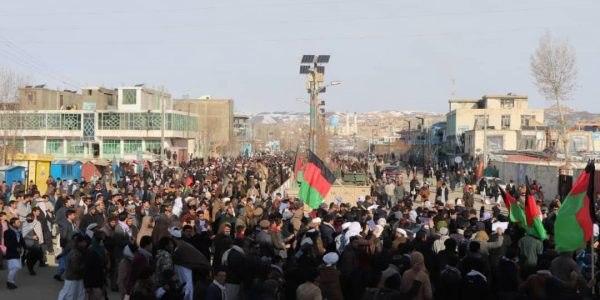Residents of the central Ghor province ended their protests yesterday, February 02, after a high level delegation assigned by President Ghani promised in a Memorandum of Understanding (MOU) to accept and meet all their demands, according to Hassan Hakimi, a representative of the protesters.
Hundreds of people took to the streets, closed almost all government offices, and set up a sit-in tent in front of the governor office demanding inclusion of several development projects into the country’s national budget for 1399 fiscal year. The projects were construction of Kabul-Ghor-Herat highway, building a solar power plant, and completion of a hydropower plant. With the protests going on against the national budget draft plan, the parliament approved it in a general assembly held Wednesday, January 22. The protests kicked off on January 21, however, lasted nearly for two weeks.
The protests were widely supported by residents of other provinces and some influential political figures.
To address the demands raised by the protesters, President Ghani sent a 12-member high level delegation to Ferozkoh, capital city of the province, on Friday, January 31. Assadullah Falah, the president’s senior adviser on disputes resolutions; Ahmad Khan Rahimi Ghori, another senior adviser to the president, and Abdullah Mesbah, general director of parliamentary affairs and public relations at the presidential palace were top members of the delegation. As stated in the president’s decree, four MPs and representatives from Ministry of Finance, Ministry of Transport, Ministry of Energy and Water, Da Afghanistan Breshna Sherkat – the national utility firm – and Independent Directorate of Local Governance were also members of the delegation.
What have been agreed?
The MOU signed between the government delegation and protesters clearly states that the delegation has accepted all demands of the protesters. According to the MOU, construction of the 40 Km Kabul-Ghor highway must be started at the beginning of the next solar year, late March 2020. It further states that the solar power plant with a 5MW capacity and connection of Ghor to the national electricity grid must be accomplished within two years.
The Afghan government started construction of the hydropower plant in the suburbs of Ferozkho around seven years ago but it has yet to be completed. Accelerating the construction process of this hydropower plant was also a demand of the protesters but MP Ata Mohammad Dehqanpoor, who is also a member of the delegation, says that the project has been canceled by the government as it will be not able to generate electricity eight years after a complete water storage.
A guaranteed MOU still looks unreliable
This is not the first time that residents of the province are protesting against the government for the same demands and sign an MOU with the Afghan government. Around three years ago, Ghor residents took to the streets and continued their protests for the same cause until a government delegation promised them to meet their demands through inking a seven-point MOU. Although their demands—construction of 100 Km Kabul-Ghor Herat highway, building a solar power plant, and construction of hydropower plant—were allocated some budget in the national budget of 1397 fiscal year, none of the projects have been completed.
This time, the protesters however pin hope for completion of the development projects and signed the MOU with the government just for a guarantee provided by MPs. “The people have kept Ghor MPs as stand surety for the government promises to be put into practice,” said Hassan Hakimi, a representative of the protesters. He further said that the protesters have set a 10-day deadline for the government to allocate the required budget for those development projects. “The government led by Ghani have made repeated promises for Ghor people, but it has never fulfilled its promises,” Mr. Hakimi criticized.
According to Abdulhai Khatibi, spokesperson for Ghor governor, the national electricity network will be extended to Ghor province through Bamyan and Herat provinces. Upon extension of the electricity network, as he stated, the power will be supplied for around 40,000 households in Ferozkoh city, Dawlatyar and Lal Wa Sarjangal districts of the province.
In a visit to the province in October 2016, President Ghani had demanded a six-month ultimatum to undertake development projects and improve security situation in the province. He had also asked the people and Ghor civil society activists to score his performance after the expiration of the six month long ultimatum. “We scored him Zero but did he pay attention?” Hakimi asked.
Underdeveloped and ignored over past 19 years
Lying in the central parts of Afghanistan, Ghor has largely remained underdeveloped over past 19 years despite billions of dollars poured into the country for construction and development aims. “All of what Ghor has achieved from development [projects] during past 19 years are just a 12 Km asphalted road in Ferozkoh, four hospitals, and around 800 schools,” said the governor spokesperson.
He detailed that all four hospitals are now facing lack of personnel and medicines and that there are no medical facility in six districts of the province. “Of 800 schools, more than 60 percent do not have buildings,” he added.
Moreover, based on the accounts of the province residents, lack of having an asphalted highway has caused increase in prices of the very basic materials imported in Ghor.
Mohammad Shah Dawlatyar, a resident of Ferozkoh, said that transportation costs has raised the price of a bottle of a cooking oil from 1,100 afghanis to 1,800 afghanis in the province.




